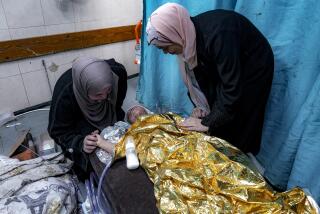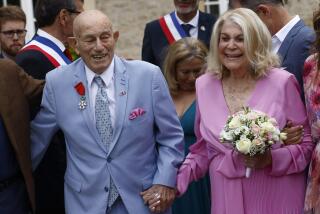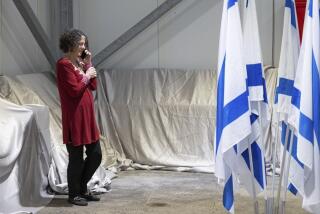Time Running Out for War Babies : World War II: Offspring of Allied soldiers are searching for their fathers. But many fear that they will be too late.
NIJMEGEN, Netherlands â Often all they have of their soldier fathers is a fading photograph or a name whispered more than 30 years ago.
But the unintended children of the American and Canadian troops who swept triumphantly through the Netherlands in 1944-45 know their search is a race against time.
âHeâs 72 this year. Iâm just terribly worried itâll be too late,â said Marian Meisters, a soft-spoken, small-town housewife.
Meisters, 47, is one of an estimated 3,000 âliberation babiesâ--illegitimate children born from brief liaisons between Dutch girls and Allied soldiers in the heady closing months of World War II.
Although an estimated 20,000 children of Allied soldiers were born in Britain, permanent bases there made for more complete personnel records.
But the speed with which Allied units moved through the Netherlands has hampered efforts here to trace the fathers.
âItâs a very personal thing to admit to, being a liberation child. Too sensitive for lots of people,â Wolfgang Oude Aost said.
He runs the search section of the Assn. of Liberation Children, based in this southeastern Dutch city on the invasion path toward Nazi Germany.
The years have helped to dissipate the reticence born of what was then one of societyâs ultimate transgressions: unwed motherhood.
âThey were girls and boys, 19 or 20. Theyâd been through all kinds of hell and they wanted a bit of warmth. Everyone understands that now,â Oude Aost said.
The 47-year-old police detective traced his own father to a small West Virginia town three years ago.
Young unwed mothers were sometimes thrown out by their parents or forced to give up their babies for adoption.
As a result, many liberation babies only stumbled upon their hidden past. Anneke van Vegten had never been told that her stepfather was not her biological father, although there was no family resemblance.
âI was about 8. I bumped into my aunt, and she just said, âGod, you look like your dad,â â said Van Vegten, who is still looking for her real father 38 years later.
Others knew they were liberation babies. But âwhen you were small, it felt too rude to ask about your real father,â said Astrid Janssen, who is flying to California in May to visit a family she discovered last year--too late to meet her father.
âI missed him,â she says of Lee Eldon Pelley, who died in 1986.
She has an untraceable place name--âSpringfield, New York Cityâ--and a photo of her mother with a young American soldier whose name, she believes, is Pat Devenery.
âThatâs my father. But my mother didnât speak much English, so the name could be a bit wrong.â
Meisters has lost count of the letters she has written to the Pentagon, veteransâ organizations, the FBI, the Red Cross, New York City police, the Salvation Army and the last four U.S. presidents.
âItâs like a brick wall. Nobody can help. Iâm not interested in his money, and I donât want to wreck a marriage,â Meisters said. âI just have to contact him, to make a missing part of me whole.â
After pressure from a British group, the U.S. National Personnel Records Center in St. Louis agreed to provide a GI fatherâs last known address and marital status.
But some successful searches end in rejection by fathers too ashamed to face up to their wartime flings.
Rob Vroegh, a 46-year-old truck driver, knows his fatherâs name, Los Angeles address and telephone number.
âThe local priest and the social worker have called on him, but he denies it all because of his wife,â Vroegh said.
More to Read
Sign up for Essential California
The most important California stories and recommendations in your inbox every morning.
You may occasionally receive promotional content from the Los Angeles Times.










